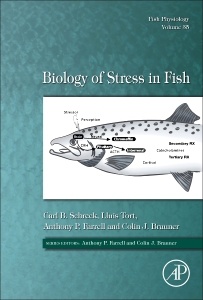Biology of Stress in Fish Fish Physiology Series
Auteurs : Schreck Carl B., Tort Lluis, Farrell Anthony, Brauner Colin

Biology of Stress in Fish: Fish Physiology provides a general understanding on the topic of stress biology, including most of the recent advances in the field. The book starts with a general discussion of stress, providing answers to issues such as its definition, the nature of the physiological stress response, and the factors that affect the stress response.
It also considers the biotic and abiotic factors that cause variation in the stress response, how the stress response is generated and controlled, its effect on physiological and organismic function and performance, and applied assessment of stress, animal welfare, and stress as related to model species.
1. The Concept of Stress in Fish
2. Variation in the Neuroendocrine Stress Response
3. The Endocrinology of the Stress Response in Fish: An Adaptation-Physiological View
4. The Molecular Stress Response
5. Stress and Growth
6. Homeostatic Responses to Osmotic Stress
7. The Stress and Stress Mitigation Effects of Exercise: Cardiovascular, Metabolic, and Skeletal Muscle Adjustments
8. Reproduction and Development
9. Cognition, Learning, and Behavior
10. Stress and Disease Resistance: Immune System and Immunoendocrine Interactions
11. Stress Indicators in Fish
12. Stress Management and Welfare
13. Stress in Fish as Model Organisms
Fish physiologists; fish pathologists; fish biologists; professional aquaculturists; ornamental fish managers and hobbyists; researchers of wild, laboratory and aquaculture fish; animal welfare and fish welfare regulatory bodies.
Dr. Colin Brauner was educated in Canada at the University of British Columbia (Ph D), followed by a Post-doctoral fellowship at Aarhus University and the University of Southern Denmark, and was a Research Associate at McMaster University. He is a Professor of Zoology, UBC and Director of the UBC Aquatics Facility. He has been a Co-Editor of the Fish Physiology series since 2006. His research inves
- Provides the definitive reference on stress in fish as written by world-renowned experts in the field
- Includes the most recent advances and up-to-date thinking about the causes of stress in fish, their implications, and how to minimize the negative effects
- Considers the biotic and abiotic factors that cause variation in the stress response
Date de parution : 10-2016
Ouvrage de 602 p.
15x22.8 cm
Thèmes de Biology of Stress in Fish :
Mots-clés :
Fish stress; fish habitat; fish immunity; fish nutrition; fish infection; fish health; fish disease; fish stress indicators; fish management; fish welfare; model fish; fish behavior; fish reproduction; fish development; fish exercise; osmoregulation; fish metabolism; fish growth; acquaculture management



